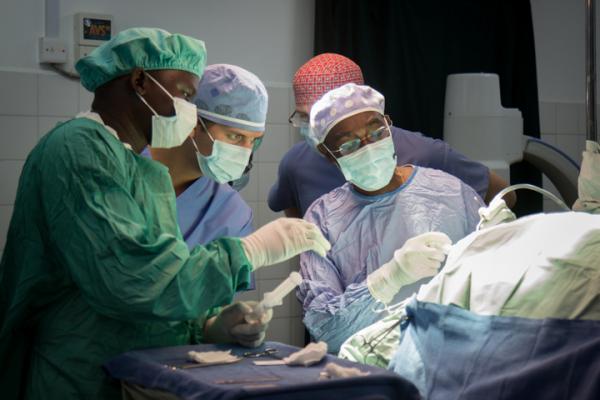
I saw incredible compassion and skill in action at the CURE Children's Hospital in Mbale, Uganda, where neurosurgeons have pioneered a minimally-invasive treatment for infant hydrocephalus, a life-threatening accumulation of fluid in the brain. Children are treated regardless of their family's ability to pay. Many mothers are fearful and hopeless when they come to the hospital. Sometimes the babies they bring are named "Cursed" or "Will Not Live Long," doctors told me. And sometimes, after they learn more about their child's condition and get help, these mothers change their babies' names to "Blessing" or "Gift."
The hospital specializes in surgery for infant hydrocephalus and also treats children with spina bifida. Even when the surgeries are a success, many of the hospital's patients will still have special needs—some with spina bifida won't be able to walk and some with hydrocephalus will have cognitive deficiencies. And, as hard as it is to care for an infant with a disability, it often gets more difficult as the child grows up. Their disability becomes more apparent with age—we don't expect much from babies. But many children with spina bifida, for example, never make milestones like walking or toilet training. They are often paralyzed from the waist down and can be incontinent.
At the hospital, I sat in as doctors interviewed parents of children with spina bifida. One man's first two children were born with the condition. The first died at age two and second is now six years old. The boy's mother abandoned the family, leaving the father to raise the couple's four surviving children. "She had a feeling that she wanted to kill the boy, and that is why she went away," the man said.
Because of his condition, the boy has to empty his bladder by catheterizing himself throughout the day. He knows how to do it, but the family ran out of catheters three years back, so he is often wet and left to the side as other children play. Before the man and his son leave that day, they'll get a new supply of catheters.
It's not uncommon for the stress of raising a disabled child to corrode relationships, doctors told me. I met a woman whose husband left her after their child was born with hydrocephalus. He said she caused the child's condition because she was taking birth control before she got pregnant.
On my last day in eastern Uganda, I went with one of the hospital's staff members to visit a former patient named Steven, a nine-year-old boy who was treated for hydrocephalus and spina bifida during the first month of his life. His mother Prossy is one of the more involved ones; she belongs to a group for parents with disabilities, for example, and has taught her son to catheterize himself.
But, she's still struggling. Her husband abandoned the family—so she supports their five kids alone. She runs a small salon in the front room of their rented house. In the corner is a colorful jumble of buckets of hair relaxers and dyes. Locks of different colored hair extensions hang on the wall.
Steven is bright and inquisitive—his favorite thing to do is to make figures out of mud, sticks and fibers he pulls from burlap sacks. In addition to chickens and goats, he makes cell phones complete with mud earbuds that he connects with strings.
But he's only gone to half a year of school. Mobility and money problems are to blame—the free government school is an hour's walk away. But Prossy, a slight woman, has to carry Steven everywhere since he outgrew his crutches. She enrolled him in a closer private school, but was unable to pay the $15 fee for this term. She's hoping to send him again next year. School was good for him, she said. "I noticed a difference in his intellect. He was learning. But now he's back home."
Prossy wants to get Steven new crutches, but hasn't been able to afford them. His last pair cost $35 and she doesn't know how much new ones would cost today. At one point, a charity gave them a wheelchair, but it was sized for an adult and hard to maneuver on the hilly terrain and dirt roads, so they stopped using it. Because he can't move around, Steven gets pressure sores on his body, though he does have friends who carry him and play with him.
Prossy said she feels badly that she hasn't been able to afford crutches. "He can't move around freely. He's limited in many ways," she said. "But it's challenging to come up with the money single-handedly."




